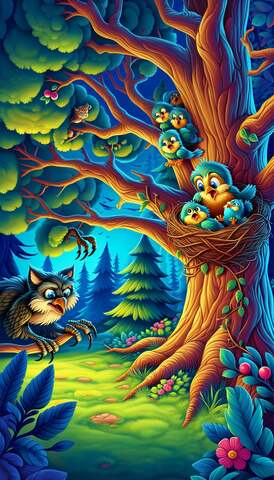
商朝末年,纣王的统治越来越糟糕。
他变得昏庸残暴,对国家大事毫不关心。
看到这个情况,周武王觉得时机已经成熟,决定推翻纣王的统治。
在弟弟周公旦的帮助下,周武王在一场名为“牧野”的战斗中成功打败了纣王,并建立了周朝。
然而,在周武王去世后,他的儿子诵继承了他的位置,成为了周成王。
由于周成王年纪还小,而周朝刚刚平定天下,周公怕其他诸侯不服气,起来反抗,于是他帮助周成王管理国家大事。
但在这个时候,周成王的一些叔叔,比如管叔和蔡叔等人,开始怀疑周公有不好的想法。
他们散布谣言说周公想要篡夺王位,并联合纣王的儿子武庚一起造反,背叛周朝。
为了平息叛乱,周公奉成王的命令,带领军队与叛军作战。
经过三年的努力,周公终于彻底平定了动乱,杀死了武庚和管叔,放逐了蔡叔。
在代理成王处理国政七年之后,当周朝的政治局面稳定下来,而成王也长大成人,能够自己治理国家时,周公就把权力交还给成王,自己回到了臣子的位置上。
根据《尚书·金滕篇》的记载,在平定了管、蔡叔以及武庚的叛乱之后,周公写了一首名叫《鸱鸮》的诗,送给了成王。
在这首诗里,周公用一只失去了孩子的母鸟来比喻自己的心情,表达他对周王朝的忠诚:“鸱鸮啊鸱鸮,你已经抓走了我的孩子,不要再来破坏我的窝。我辛苦勤劳地筑巢,养育幼子让我累病了。趁着老天还没下雨,我剥取桑根的皮,把窝里的空隙缠补牢固。现在树下的人们,有谁还敢把我欺侮?为摘取茅草花垫巢,我的脚爪早已疲惫,为积聚储存干草,我的嘴角也磨破了,可是我的窝还没修筑好。我的羽毛凌乱稀疏,我的尾巴干枯无光泽,我的窝在危险的树梢上摇晃。它在风吹雨打中飘荡,我只能恐惧而无助的大声惊叫!”
后来,“风雨所漂摇”这句话被简化为“风雨飘摇”这句成语。
原本的意思是指树梢上的鸟巢在风吹雨打中飘荡,引申为比喻情况或局势动荡不安。
At the end of the Shang Dynasty, King Zhou's rule became increasingly bad.
He became corrupt and cruel, showing no concern for state affairs.
Seeing this situation, King Wu of Zhou felt that the time was ripe and decided to overthrow King Zhou's rule.
With the help of his younger brother, Duke of Zhou, King Wu successfully defeated King Zhou in a battle called 'Mu Ye' and established the Zhou Dynasty.
However, after King Wu of Zhou passed away, his son Song inherited his position and became King Cheng of Zhou.
As King Cheng of Zhou was still young and the Zhou Dynasty had just pacified the world, the Duke of Zhou feared that other vassals would not be convinced and rise up in rebellion, so he helped King Cheng manage state affairs.
But at this time, some of King Cheng's uncles, such as Guan Shu and Cai Shu, began to suspect that the Duke of Zhou had ulterior motives.
They spread rumors that the Duke of Zhou wanted to seize the throne and joined forces with King Zhou's son, Wu Geng, to rebel against the Zhou Dynasty.
In order to quell the rebellion, the Duke of Zhou led the army to fight against the rebels under King Cheng's orders.
After three years of effort, the Duke of Zhou finally completely pacified the unrest, killed Wu Geng and Guan Shu, and exiled Cai Shu.
After seven years of acting on behalf of King Cheng to handle state affairs, when the political situation of the Zhou Dynasty stabilized and King Cheng grew up and was able to govern the country himself, the Duke of Zhou handed over power to King Cheng and returned to his position as a minister.
According to the records in the 'Golden Teng' chapter of the Book of Documents, after suppressing the rebellions of Guan Shu, Cai Shu, and Wu Geng, the Duke of Zhou wrote a poem called 'Owl' and gave it to King Cheng.
In this poem, the Duke of Zhou used a mother bird who had lost her child as a metaphor for his own feelings, expressing his loyalty to the Zhou Dynasty: 'Owl, owl, you have already taken my child, don't come again to destroy my nest. I worked hard to build the nest and raising the young made me sick. Taking advantage of the fact that the sky has not yet rained, I peeled off the bark of the mulberry root and wrapped it around the gaps in the nest. Now, who among the people below the tree would dare to bully me? For plucking the cattail flowers to pad the nest, my claws are already tired, for gathering and storing dry grass, my mouth is also worn out, but my nest is not yet built. My feathers are messy and sparse, my tail is dry and dull, my nest is swaying on a dangerous branch. It is drifting in the wind and rain, and I can only scream in fear and helplessness!'
Later, the phrase 'shaken by the wind and rain' was simplified to the idiom 'shaken by the wind and rain'.
Originally meaning that the bird's nest on the tree branch was swaying in the wind and rain, it is extended to比喻 a situation or situation that is unstable.